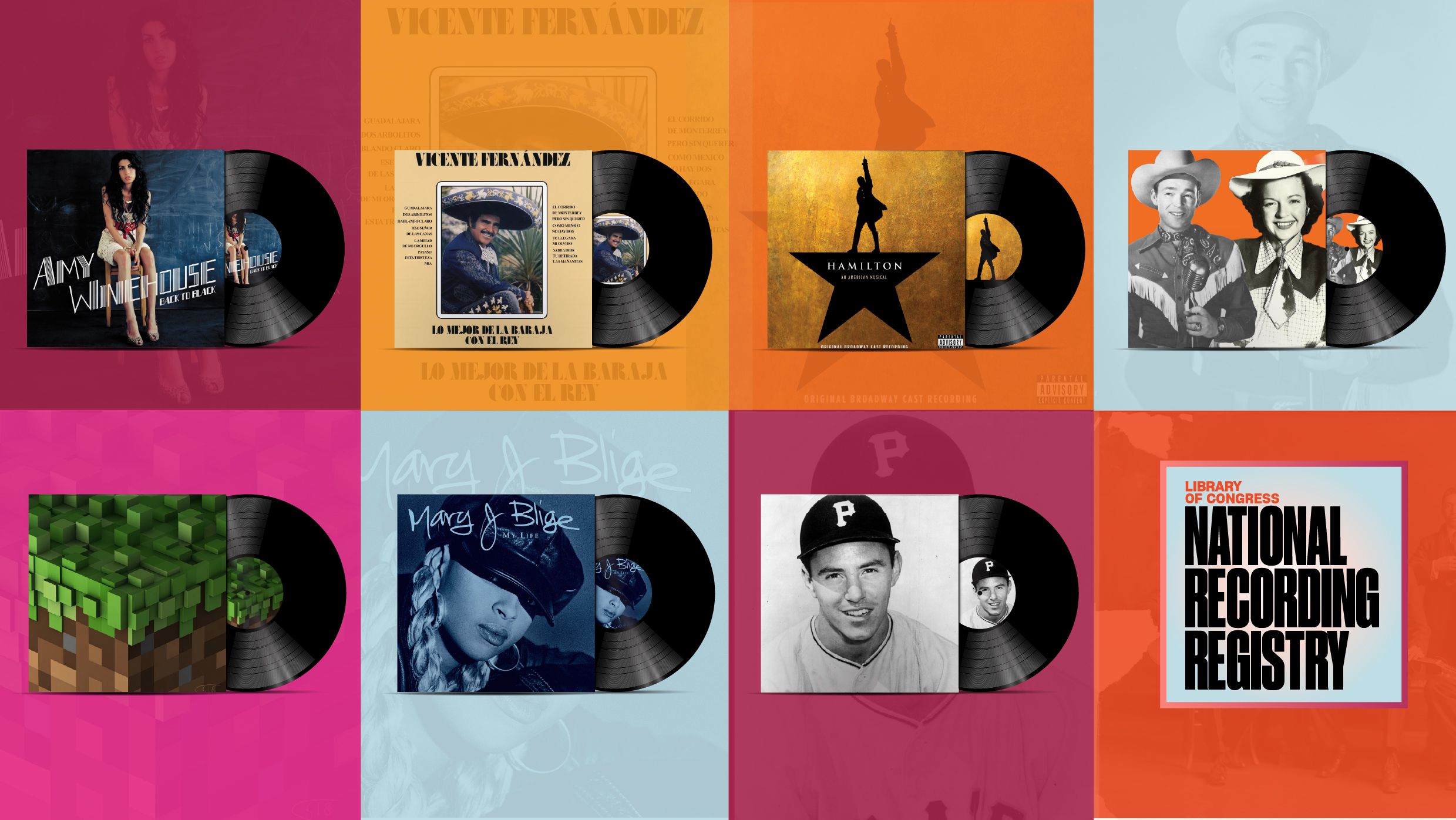The National Recording Preservation Foundation congratulates the artists, composers, songwriters, and publishers recognized in the National Recording Registry’s Class of 2025. Each year, the Librarian of Congress selects twenty-five sound recordings, chosen from a slate of public nominations, which represent audio treasures worthy of preservation in perpetuity based on their cultural, historical or aesthetic importance to the nation’s recorded sound heritage. The 2025 inductees were announced today!
 Above: a graphic featuring cover images of seven exemplars inducted to the 2025 National Recording Registry.
Above: a graphic featuring cover images of seven exemplars inducted to the 2025 National Recording Registry.
The 2025 National Recording Registry
Today, Librarian of Congress Carla Hayden named 25 audio recordings to be desiganted as treasures worthy of preservation for all time based on their cultural, historical, or aesthetic importance to the nation’s heritage.
The 2025 registry features a wide range of genres and styles that span the breadth of America’s recorded sound heritage. Elton John’s monumental album “Goodbye Yellow Brick Road,” Chicago’s debut “Chicago Transit Authority,” the original cast recording of Broadway’s “Hamilton,” Mary J. Blige’s “My Life,” Amy Winehouse’s “Back to Black,” Brian Eno’s reboot chime for Microsoft Windows, and the soundtrack to the Minecraft video game phenomenon have been selected as some of the defining sounds of history and culture that will join the National Recording Registry of the Library of Congress.
In her announement, Hayden noted, “These are the sounds of America – our wide-ranging history and culture. The National Recording Registry is our evolving nation’s playlist.”
For National Public Radio’s Morning Edition today, Neda Ulaby noted the earliest and most recent additions:
“The oldest recording on this year’s list is from 1913. “Aloha ‘Oe” was composed by Princess Lili’uokalani (who later became Queen of Hawai’i). The song had been beloved in Hawai’i for decades before being set to wax by the Hawaiian Quintette.
The newest recording is 2015’s Broadway cast album of Hamilton. Creator Lin-Manuel Miranda noted its inclusion coincides with the show’s 10th anniversary.” Read the full profile at NPR
NRPF Impact
Since 2012, the National Recording Preservation Foundation (NRPF) has awarded over a quarter of a million in grants to support unique, at-risk audio collections held by non-profit audio archives, libraries, and other cultural heritage organizations. To learn more, check out our NRPF preservation grants page and read our 2024 Annual Report.
The Urgency of Audio Preservation
The new inductees to the National Recording Registry remind us of the significance of preservation support for significant audio recordings. Imagine if any of these recordings were lost or no longer available! The Registry represents the pinnacle of American recordings, symbolizing the larger body of recordings held by audio archives and collections stewarded by the recording industry, libraries and archives, and individuals. All analog sound recording formats are at high risk of loss due to the degradation of physical media and the increasing difficulty of finding or maintaining playback equipment.
The NRPF’s mission is to raise awareness about the significance of these recordings, assist in gathering resources to preserve them, and to support at-risk audio recordings in the many more collections that do not make it to the national registry. One way we can increase our impact is through private donations, which we gather together and return to audio archives and other non-profit collecting organizations through preservation grants.
Donate
A donation to the National Recording Preservation Foundation supports the work of non-profit audio archives, libraries, and other cultural organizations, to secure the longterm availability of at-risk audio heritage. Donations can be made directly at https://secure.givelively.org/donate/national-recording-preservation-foundation/.
Listen
Listen to many of the recordings on your favorite streaming service. The Digital Media Association (DiMA), a member of the National Recording Preservation Board, compiled a list of some streaming services with National Recording Registry playlists, available at https://dima.org/national-recording-registry-class-of-2025/. You can also hear many of the historic recordings on the Registry via the Library of Congress’ National Jukebox and other listening resources.
About the National Recording Registry
Under the terms of the National Recording Preservation Act of 2000, the Librarian of Congress, with advice from the National Recording Preservation Board, selects 25 titles each year that are “culturally, historically, or aesthetically significant” and are at least 10 years old. More information on the National Recording Registry can be found at the web page of the National Recording Preservation Board. The public may nominate recordings for the Board’s consideration here.
Some registry titles have already been preserved by the copyright holders, artists or other archives. In cases where a selected title has not already been preserved, the Library of Congress National Audio-Visual Conservation Center works to ensure that the recording will be preserved by some entity and available for future generations. This can be through the Library’s recorded-sound preservation program or through collaborative ventures with other archives, studios and independent producers.
Learn More
See the full list of inductees at the press release from the Library of Congress: https://newsroom.loc.gov/news/national-recording-registry-inducts-sounds-of-elton-john–chicago–broadway-s–hamilton—mary-j.-bl/s/986b2312-27dd-4b66-bd41-3113e0cb2e57. WAMU’s “1A,” syndicated on many NPR stations, will feature coverage today and in the weeks ahead through its series, “The Sounds of America,” which will feature interviews with Dr. Hayden and several featured artists from this year’s National Recording Registry. Follow the conversation about the registry on Instagram, Threads, and other @librarycongress social media. Or, look for the hashtag #NatRecRegistry.




